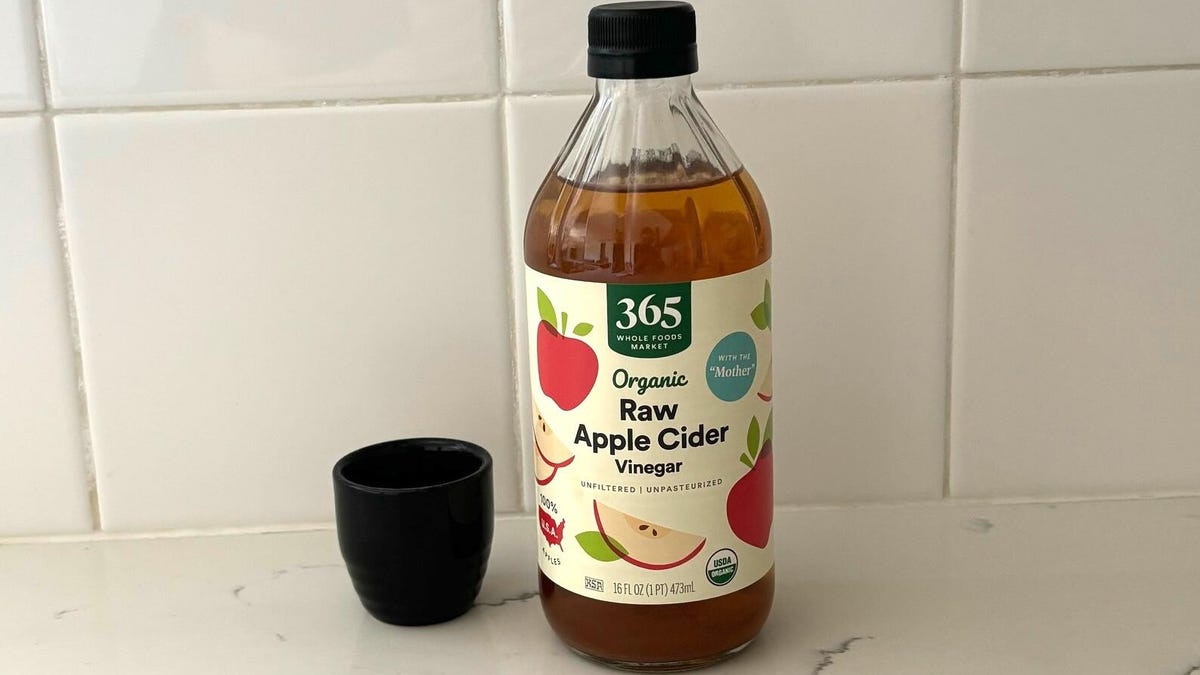The Power of Apple Cider Vinegar: Benefits and Proper Dosage Explained




In recent years, apple cider vinegar has become a social media phenomenon, whether people are talking about the health benefits of the vinegar or how they use it to clean the house. Is apple cider vinegar as great as it’s hyped up to be? Is it worth consuming and using around the house?
Vinegar has a long historydating back to at least 5,000 B.C. Its many uses include preserving, flavoring, pickling, and medicine. Apple cider vinegar in particular has antimicrobial and antioxidant properties, and there is research to support at least some of the claims made about its health benefits.
Yes, apple cider vinegar has health benefits that you can take advantage of with the right dosage. Don’t ignore the potential side effects before trying it out. Read on to learn more about the potential health benefits, side effects, and the best dosage to follow.
For more cooking and wellness information, read about whether your nonstick pans are safe to use and the 11 foods you should avoid in your diet.
What is apple cider vinegar?
When you combine apples, sugar and yeast and let it ferment, you get apple cider vinegar. Over several weeks, the yeast will digest the sugar to create alcohol. Once this happens, natural bacteria will convert the alcohol into acetic acid, which is where the tangy smell and taste of apple cider vinegar comes from.
You have two options when buying apple cider vinegar: filtered and pasteurized, or raw and unfiltered. The cloudy sediment that collects at the bottom of the bottle is “the mother,” a combination of bacteria and yeast. Some speculate that the mother provides the health benefits because it contains traces of healthy bacteria and probiotics.
Apple cider vinegar can be used in the kitchen, around the house and for your health as:
- Air freshener
- Preservative
- Dressing or vinaigrette
- Cleaner
- Facial toner
- Marinade
- Fruit and vegetable wax
- Denture cleaner
- Hair rinse
- Treatment of dandruff
- Weed killer
- Mouthwash

4 Benefits of Apple Cider Vinegar You Should Know
Although more research is needed, several small and medium-sized studies show that benefits of apple cider vinegar for certain health conditions and as a possible aid in weight loss.
1. May help regulate blood sugar levels and diabetes
To 95% of diabetics have type 2 diabetesaccording to the Centers for Disease Control and Prevention. Type 2 diabetes is caused by insulin resistance, which “is when cells in the body don’t respond properly to insulin, leading to increased levels of sugar or glucose in the blood,” according to Amelia Tia registered dietitian in NYC.
Even if you don’t have diabetes, it’s best to keep your blood sugar levels within normal ranges. Studies have shown that apple cider vinegar can Improve insulin response And lower blood sugar levels after the meal.
Drinking apple cider vinegar before bed has also been shown to promote sleep. lower fasting blood sugar levels after waking up. Be sure to talk to your doctor before using ACV if you have diabetes, especially if you are taking medications.
It’s also important to note: “ACV alone does not lower blood sugar levels and should not be considered a replacement for diabetes medications,” Ti says.
Read more: The Atlantic Diet: Why Eating Whole, Local Foods Can Improve Your Health
2. Kills harmful bacteria

People who want to preserve food naturally may want to consider using apple cider vinegar. It is a well-known pathogen killerwhich includes microbes such as staphylococci and candida.
Vinegar is a popular preservative in Korea because it can prevent E. coli and norovirus from growing in food. E. coli can cause food poisoning when consumed, but the bactericidal effects of the acetic acid in apple cider vinegar can prevent it from happening.
Read more: 12 Best Probiotic Foods for Healthy Gut Flora
3. May lead to weight loss
Another benefit of apple cider vinegar that may be helpful is its ability to help with Weight lossACV, when taken before or with a meal, has been shown to help with satiety (the feeling of fullness).
In one study, participants ate about 200 to 275 calories less when apple cider vinegar was combined with a meal. Over three months, participants who took one to two tablespoons of ACV per day saw up to 3.7 pounds weight loss and a reduction in body fat.
4. May improve cholesterol levels
High cholesterol and triglyceride levels can increase your risk of heart disease.
Adding up to an ounce of apple cider vinegar to your day, along with a reduced calorie diet, can lower total cholesterol and triglycerides while also increasing “good” HDL cholesterol.
People with type 2 diabetes may also experience: positive results on their total cholesterol and triglyceride levels by adding 15 grams of apple cider vinegar to their diet.
Read more: 7 Money Saving Tips for Healthy Eating on a Budget
Possible side effects to watch out for
While there are benefits to using apple cider vinegar, there are also possible side effects to consider. The high acidity can erode the enamel of your teeth, which will not come back once it is gone. It can cause damage to your esophagus or throat if you drink it undiluted.
Here are some other possible side effects of apple cider vinegar:
- May cause hypokalemia (low potassium levels)
- May interact with diuretics, insulin and other medications
- May cause nausea or vomiting
- Can weaken tooth enamel
- May cause burns or ulcers in the esophagus (throat) if used excessively
Diluting it with water or juice not only makes ACV more palatable, but it can also reduce the risk of damage to your throat and teeth. Combining a tablespoon or two of either can also help with an upset stomach.
Marisa MooreMBA, RDN, LD, a registered dietitian, also advises, “It’s important to remember that no food is a magic bullet. If you choose to add apple cider vinegar, do so safely and with a focus on maintaining a balanced diet for your overall health and well-being.”
How Much Apple Cider Vinegar Should You Drink Per Day?
Apple cider vinegar dosage depends on why you’re using it. In general, Ti says, “I recommend 1 teaspoon to tablespoon of ACV diluted in 6-8 ounces of warm water before meals.”
If you want to drink it, dilute it with water or your favorite juice or tea. You can also eat it by incorporating it into your favorite dishes, especially dressings, vinaigrettes, and even making your own mayonnaise.
There are also plenty of pre-made apple cider vinegar drinks available that can make ACV more palatable. You can find these drinks from brands like Bragg, Poppi, Remedy, and Sidekick Sodas. Local health food stores and even grocery stores may carry these, so keep an eye out for them if you’re interested in apple cider vinegar drinks.
You can also add a cup or two to a bath for skin problems. By mixing a tablespoon of ACV with a cup of water and then soaking gauze or cotton in the solution, you can make a wet wrap.
To use apple cider vinegar as a hair rinse, mix up to two tablespoons with one cup of water and pour over hair after shampooing. Wait five minutes, then rinse. It can be drying, so use sparingly. ACV can also irritate the scalp, so a weaker dilution may be better.

In short
While some studies have shown the benefits of apple cider vinegar, we need more research to definitively prove how beneficial ACV is. It can aid in weight loss, control type 2 diabetes, blood sugar and cholesterol, and it can also prevent the growth of harmful bacteria on food. Drinking undiluted apple cider vinegar can cause erosion of tooth enamel or damage to the throat. Mixing ACV with water or juice before consuming it can prevent damage to the teeth and throat. As with any natural remedy, talk to your doctor before trying apple cider vinegar and do a skin patch before using it on your skin.
“Remember that the benefits of adopting an overall healthy lifestyle (e.g., nutritious and balanced diet, adequate hydration, regular physical activity/exercise, good sleep, stress management, etc.) far outweigh those of any single food, drink, or supplement,” Ti concludes. “There is no quick fix and ACV is definitely not a miracle cure!”




